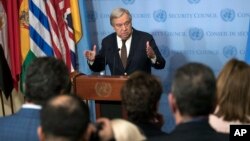ສະຫະລັດອາດຈະເປັນເປົ້າໝາຍທີ່ຍັງຕ້ອງໄດ້ປະຕິບັດຕາມຂໍ້ຜູກພັນຂອງຕົນທີ່
ລະບຸຢູ່ໃນຂໍ້ຕົກລົງປາຣີ ກ່ຽວກັບການປ່ຽນແປງຂອງດິນຟ້າອາກາດ ເຖິງແມ່ນວ່າ ປະທານາທິບໍດີດໍໂນລ ທຣໍາ ເວົ້າວ່າ ຈະຖອນສະຫະລັດອອກຈາກຂໍ້ຕົກລົງດັ່ງ
ກ່າວນັ້ນແລ້ວກໍຕາມ.
ທ່ານ ແອນໂຕນິໂອ ກູແຕເຣັສ (Antonio Guterres) ເລຂາທິການໃຫຍ່ ຂອງອົງ
ການສະຫະປະຊາຊາດກ່າວໃນວັນພະຫັດວານນີ້ ຢູ່ທີ່ສໍານັກງານໃຫຍ່ ຂອງອົງການ
ສະຫະປະຊາຊາດວ່າ ຍ້ອນມີການປະຕິບັດການ ຂອງບັນດານັກທຸລະກິດ ແລະເຈົ້າ
ໜ້າທີ່ທ້ອງຖິ່ນ, ສະຫະລັດ "ອາດຈະສາມາດປະຕິບັດຕາມຄໍາໝັ້ນສັນຍາທີ່ຕົນໄດ້
ໃຫ້ໄວ້ຢູ່ໃນສັນຍາດັ່ງກ່າວນັ້ນໄດ້ ໃນນາມທີ່ເປັນປະເທດນຶ່ງ"
ທ່ານກ່າວອີກວ່າ, "ຢູ່ທົ່ວທັງໂລກ ບົດບາດຂອງລັດຖະບານມີຄວາມເໝາະສົມຫລຸດ
ນ້ອຍຖອຍລົງນັບມື້. ສ່ວນບົດບາດຂອງເສດຖະກິດ, ບົດບາດຂອງສັງຄົມ ແມ່ນນັບມື້
ມີຄວາມເໝາະສົມຫລາຍຂຶ້ນ."
ໃນປີ 2015, ໃນສະໄໝລັດຖະບານທ່ານໂອບາມາ, ສະຫະລັດແມ່ນປະເທດນຶ່ງຢູ່ໃນ
ປະເທດຈໍານວນເກືອບຮອດ 200 ປະເທດທີ່ໄດ້ເຊັນຂໍ້ຕົກລົງທີ່ສັນຍາວ່າຈະຕັດການ
ປ່ອຍອາຍຄາບອນໄດອັອກໄຊ ແລະອາຍພິດເຮືອນແກ້ວລົງ, ແລະຈໍາກັດ ການເພີ້ມ
ຂຶ້ນຂອງພູມອາກາດ ຈາກລະດັບກ່ອນສະໄໝອຸດສາຫະກໍາ ບໍ່ໃຫ້ກາຍ 2 ອົງສາແຊລ
ຊຽສ ນັ້ນອີ່ຫລີ. ຂໍ້ຕົກລົງດັ່ງກ່າວໄດ້ກາຍມາເປັນສັນຍາ ປາຣີ.
ທ່ານທຣໍາໄດ້ອະທິບາຍກ່ຽວກັບສັນຍາດັ່ງກ່າວວ່າເປັນ "ຂໍ້ຕົກລົງທີ່ບໍ່ດີເລີຍ" ສໍາລັບ
ສະຫະລັດ.
ເຖິງແນວໃດກໍຕາມ ຢູ່ພາຍໃຕ້ສັນຍາປາຣີນັ້ນ ສະຫະລັດບໍ່ສາມາດທີ່ຈະຖອນໂຕອອກ
ຈາກສັນຍາໄດ້ຈົນຮອດປີ 2020.
The U.S. may be on target to meet its obligations under the Paris agreement on climate change, even though President Donald Trump has said he will withdraw the country from the pact.
U.N. Secretary-General Antonio Guterres said Thursday at the U.N. that because of the actions of businesses and local authorities, the U.S. "might be able to meet the commitments made in Paris as a country."
He said, "All around the world, the role of governments is less and less relevant. The role of the economy, the role of the society is more and more relevant."
In 2015, during the Obama Administration, the U.S. was among nearly 200 nations that signed an agreement vowing to curb carbon dioxide and other greenhouse gas emissions, limiting temperature rise to well below two degrees Celsius above pre-industrial levels. The agreement became known as the Paris Accord.
Trump described the pact as a "bad deal" for the U.S.
Under the Paris Accord deal, however, the U.S. cannot officially resign from the agreement until 2020.
Even if the U.S. does meets its climate goals, Guterres said climate change remains "the most systemic threat to humankind" with 2017 filled with climate chaos and 2018 poised to produce "more of the same."
"I am beginning to wonder how many more alarm bells must go off before the world rises to the challenge," Guterres said.
The U.N. will hold a climate summit next year in New York to boost the resolve of countries to meet the emission goals of the Paris Accord.
Climate change "is still moving much faster than we are," Guterres said. "Scientists are now worried that unless accelerated action is taken by 2020, the Paris goal may become unattainable."
ສປຊ ເວົ້າວ່າ ສຫລ ຈະສາມາດ ປະຕິບັດ ຕາມສັນຍາປາຣີ ກ່ຽວກັບ ການປ່ຽນແປງ ຂອງດິນຟ້າອາກາດ ໄດ້





